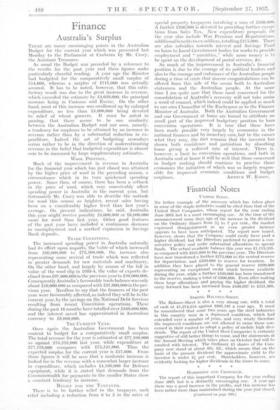Finance Australia's Surplus
THERE are many encouraging points in the Australian Budget for the current year which was presented last Monday to the Parliament at Canberra by Mr. Casey, the Assistant Treasurer.
As usual the Budget was preceded by a reference to the results for the past . year and these figures make particularly cheerful reading. A year ago the Minister had budgeted for the comparatively small surplus of £14,000, whereas a surplus of £711,000 was actually secured. It has to be noted, however, that this satis- factory result was due to the great, increase in revenue, which exceeded the estimate by £4,059,000, the principal increase being in Customs and Excise. On the other hand, most of this increase was swallowed up by enlarged expenditure, no less than £4,006,000 being devoted to relief of wheat growers. It must be noted in passing, that there seems to be one similarity between the Australian Budget and our own, namely, a tendency for surpluses to be attained by an increase in revenue rather than by a substantial reduction in ex- penditure. Indeed the art of budgeting nowadays seems rather to be in the direction of underestimating revenue in the belief that budgeted expenditure is almost sure to be increased by large supplementary estimates.
WOOL POSITION.
Much of the improvement in revenue in Australia for the financial year which has just closed was attained by the higher price of wool in the preceding season, a circumstance which in its turn quickened spending power. Since then, of course, there has been a setback in the price of wool, which may conceivably affect spending power in Australia in the current year, but fortunately Mr. Casey was able to describe the outlook for wool this season as brighter, recent sales having been on a considerably higher level than last year's average. On present indications, lie said, Australia this year might receive possibly £6,000,000 or £8,000,000 more for wool than last year. Other good features of the past year have included a continuous decrease in 'unemployment and 'a marked expansion in Savings Bank deposits.
TRADE CONDITIONS.
The increased spending power in Australia naturally had its effect upon imports, the 'valife of which increased from £60,000,000 to £72,500,000, the increase also representing some revival of trade which was reflected in greater demands for raw materials and machinery. On the other hand, and largely by reason of the fall in value -of the wool clip in 1933-4, the value of exportg de- clined from £97,000,000 in the previous year to £89,000,000. Consequently Australia's favourable trade balance was only about £16,000,000 as compared with £37,000,000 in the pre- vious year. Needless to say that the finances of the past year were favourably affected, as indeed they will be in the current year, by the savings on the National Debt Services resulting from recent Conversion operations. Theie during the past 18 months have totalled over £160,000,000, and the interest saved has approximated in' Australian currency to £3,000,000.
THE' CURRENT YEAR:
Once again the Australian Government has been content to budget for a comparatively small surplus. The total revenue for the year is estimated at £77,190,000 as against '£76,252,000 last year, while expenditure at £77,178,000 compares with £75,541,000. Thus the expected surplus for the current year is £17,000. From these figures it will be seen that a moderate increase. is looked for in the revenue with a somewhat larger increase in expenditure, which includes £4,160,000 for Defence equipment, while it is stated that demands froin the Commonwealth for payments to the smaller States show a constant tendency to increase.
RELIEF ron. THE TAXPAYER.
There is to be further relief to the taxpayer, such relief including a reduction from 6 to 5 in the rates of special property taxpayers involving a sum of £200,000. A further £200;000 is devoted to providing further excep.' tions from Sales Tax. New expenditure proposals for the year also include War Pensions and Repatriations, additional benefits to ex-soldiers, totalling £175,000. There are 'also subsidies towards interest and Savings Ftind on loans to Local Government bodies for works to provide employment and " amenities,", while more money is . to be spent on the development of postal services. &c. So much of the improvement in Australia's financial position is due to the courage of its political leaders and also to the courage and endurance of the Australian people during a time of crisis that sincere congratulations can be offered from this side of the ocean both to Australian statesmen and the Australian people. At the same time I am quite sure that, those most concerned for the consolidation of Australia's recovery will not take amiss a word of counsel, which indeed could be applied as much to our own Chancellor of the Exchequer as to the Finance Minister of Australia. Both the Australian Government and our Government at home are bound to attribute no small part of the improved budgetary position to loan conversion operations. It is true that these have been made possible very largely by economies in the national finances and by monetary ease, but be the causes what they may, the fact remains that the investor has shown both confidence and patriotism by absorbing loans giving a reduced rate of interest. There is, however, a limit to conversion operations, and both in Australia and at home it will be well that those concerned in budget making should continue to practise those economies the initiation of which was so largely respon- sible for improved economic conditions and budget














































 Previous page
Previous page